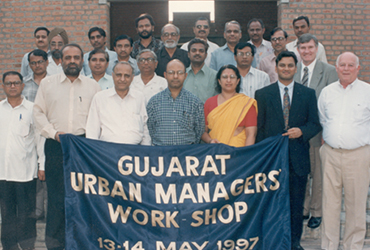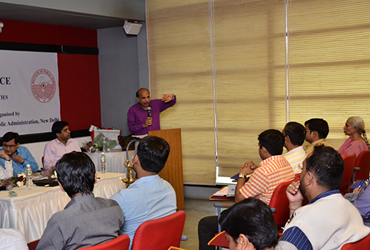

City Managers' Association Gujarat (CMAG) is a membership-based association of municipal bodies of Gujarat and institutions/individuals in the field of urban governance. CMAG provides a common platform to the "City Managers" to interact, exchange information and channelise their efforts to achieve common goals. Also, it acts as a nodal agency to carry out various programs to strengthen local governance.
Today in India out of the 29 states, Gujarat is one of the few leading industrialized states witnessing high economic growth. As a result, cities are growing at tremendous rates. Significant changes are visible in the sphere of urban finance and in the levels of awareness and participation among various sections in citizenry. The financial situation of the major cities has improved vastly, mainly due to increased efficiency of collection of Octroi. Sources of non-tax revenues are also being explored. For example, Ahmedabad is the first city in South-Asia to have issued Municipal bonds. The improved financial situation of the municipalities has enabled them to invest more in public services.
Today, there is a much greater understanding and acceptance of the role of cities in economic growth. Awareness level regarding city-planning issues has improved, and this is reflected in the increased involvement of NGOs and the private sector. Municipal Corporations in Gujarat have successfully launched many urban development initiatives, which involve public-private partnerships; these include projects which range from sponsored litterbins to slum development, and redesigning of streets. All these changes have helped to create a conductive atmosphere in Gujarat for constructive work in cities.
The bye-laws of CMAG defines "City Manager" as the person who has worked, or is working in any Municipal Corporation, Urban Development Authority, Municipality above one lac population, institution involved in research, training or urban management or in an NGO providing municipal services in the capacity of:
Increasing rate of urbanization, dynamics of economics and the changing professional culture have added a new set of parameters for achieving efficiency in urban governance. In this phase of transition, a need was felt to have a forum to support professional development of urban managers and enhance their in house capacity to tackle complex issues.
There was thus a need to establish a forum that could provide all this and also guide the local bodies in use of appropriate municipal technologies by establishing national and international networking. In the above context, City Managers' Association Gujarat was formed with the objectives of information exchange and dissemination, training/skill upgradation and advocacy.

A preparatory workshop to discuss the formation of CMA, Gujarat, was organized in May 1997. Senior representatives of Municipal Corporations, Municipalities and Urban Development Authorities, key NGOs and academic/research institutions of Gujarat participated. The workshop, held at Ahmedabad, was sponsored by the United States Agency for International Development (USAID). USAID also made available, the services of senior representatives from the International City/County Management Association, Washington (ICMA) to facilitate the proceedings of the workshop; the participants finalized the objectives of CMAG, and listed out the activities it should take up towards achieving these objectives.
Potential member organizations were identified, and organizational structure was worked out. A detailed code of ethics was drawn up which was based largely on the ICMA's code. A work plan for the first year was also discussed. Subsequently, the organization has been registered as a society and a public trust under the Societies act 1860 and The Bombay Public Trust Act 1950 respectively. CMAG Office was inaugurated on December 11th 1997.

The workshop to do a strategic planning was organized on 4th December 1999. It was a milestone in the growth and development of City Managers' Association, Gujarat. The strategic planning exercise was supported by International City/County Management Association under the organizational strenghting support contract of USAID. The workshop was attended by office bearers of CMAG, members of CMAG, stakeholders sharing common interests, and senior representatives from ICMA and USAID. It aimed at preparing a strategic plan for CMAG. In accordance with the strategic planning approach, CMAG carried out SWOT analysis and a feedback questionnaire survey of the association members.
After some retrospection, four issues were identified viz.Dynamic membership structure and membership fees - Organizational strengthening and financial sustainability - Information dissemination and exchange - Training, capacity building and advocacy programs. Working groups were formed for each of the above heads. Discussion papers were prepared to guide them through key decision points. The groups discussed various aspects, and came out with suggestions for the strategic plan. The final strategic plan was formulated on 8th Dec 1999.